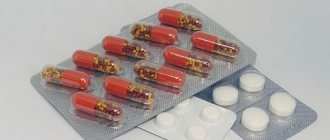Today you can buy a wide range of drugs for the treatment of respiratory diseases at the pharmacy. But not all of them meet the criterion of optimal price-performance ratio. Some are expensive, others do not help. Don’t waste time experimenting with your health, because any pharmacy has Sinupret®, a drug with proven effectiveness and an affordable price.
Sinupret® is sold in different forms and is suitable for both adults and children. It was for young patients that Sinupret® syrup was developed - a practical and convenient remedy for the treatment of rhinitis, sinusitis, and other diseases associated with inflammation of the paranasal sinuses.
Composition of the drug Sinupret
The doctor observing the patient may prescribe the drug Sinupret. This is a combination medicine based on medicinal herbs.
Among the effects that Sinupret has are mucolytic, expectorant and anti-inflammatory. It is often prescribed for colds, sinusitis, sinusitis and sinusitis.
You can find Sinupret in the pharmacy in the form of tablets, oral drops and syrup. Sinupret tablets are prescribed to adults and children as a complex therapy if sinusitis is characterized by the presence of a viscous secretion. Drops and syrup are indicated for children and those who cannot take pills.
Plant components (verbena, primrose, sorrel, black elderberry, gentiana) are highly productive and work well together. This means that they effectively cope with swelling of the mucous membrane and nasal congestion, regulate secretions, normalize sinus ventilation, and stimulate drainage. Thus, Sinupret has a secretomotor, secretolytic and anti-inflammatory effect.
Since Sinupret is based on medicinal herbs, let's look at what effect you can expect from each of them.
Verbena normalizes metabolic processes. It works as a tonic, analgesic, and anti-inflammatory agent. As part of Sinupret, Verbena acts as a component that dilutes viscous secretions, relieves allergic reactions and works as an antispasmodic.
Primrose is included as a sedative, expectorant and antispasmodic. Primrose stimulates secretion, which means that phlegm is eliminated faster.
Sorrel in Sinupret to provide anti-allergic, wound-healing, hemostatic, antiseptic and anti-inflammatory effects.
Black elderberry eliminates swelling of the nasal mucosa. It has a disinfectant and, accordingly, anti-inflammatory effect.
Sinupret copes well with chronic rhinitis
Thus, the complex of herbs in the Sinupret medicine:
- reduces the viscosity of sputum;
- facilitates the process of sputum discharge;
- effectively clears the sinuses of secretions;
- eliminates bronchospasm;
- normalizes the protective function of the respiratory tract epithelium;
- acts as an antiviral and anti-inflammatory agent.
And Sinupret, due to its combined nature, enhances the effectiveness of antibiotic treatment.
Sinupret's plant base provides another important advantage. The drug acts gently, does not cause addiction and has a small list of adverse reactions of the body. Sinupret improves the body's resistance to viruses and bacteria, and is therefore especially recommended for patients with weakened immune systems.
Why Sinupret® syrup is in great demand
Sinupret® syrup is one of those drugs that can be used to treat children from 2 years of age. The formula of the product is natural and contains components of 5 plants: verbena, primrose, sorrel, elderberry, gentian. Thanks to this composition, the drug has a complex effect on the body and promotes effective rapid recovery.
The naturalness of the drug is one of its significant advantages. There are practically no allergic reactions to Sinupret®; if the dosage is observed, the drug is easily tolerated by the body and shows excellent results.
Syrup is the optimal form for children's medicines. It has a pleasant taste and consistency that is comfortable for babies. The drug simultaneously acts on the disease from different fronts:
- has a secretolytic effect;
- promotes productive removal of mucus;
- has anti-inflammatory properties;
- has antibacterial and antiviral effects;
- promotes rapid recovery and prevents complications
Sinupret® syrup is a convenient and effective solution for the treatment of sinusitis in children.
Contraindications
Although Sinupret is a herbal drug, it has a list of contraindications, like any drug. Sinupret drops and syrup are contraindicated for:
- hypersensitivity and intolerance to the component(s) of the drug;
- epilepsy;
- liver diseases;
- brain diseases;
- alcoholism;
- pregnancy, breastfeeding;
- age up to 2 years.
Sinupret in pill form should not be used for:
- sucrase-isomaltase deficiency;
- intolerance to galactose, fructose;
- lactase deficiency;
- disturbances in the absorption of glucose-galactose.
How to take Sinupret?
The dosage, duration of treatment or prescription of another drug is determined by the attending physician. Only he can adequately assess the course of the disease and the necessary measures. The therapeutic course of Sinupret is usually 7-14 days. If there is no improvement, you should consult a doctor for advice and adjustment of the prescription.
How to take Sinupret correctly
Dragee Sinupret:
- Adults and children over 12 years old: 2 tablets 3 times a day.
- Children 6-12 years old: 1 tablet 3 times a day.
Sinupret drops:
- Adults: 50 drops of medication 3 times a day.
- Children over 10 years old: no more than 25 drops 3 times a day.
Sinupret syrup:
- Adults and children over 12 years old: 7 ml of syrup 3 times a day.
- Children 6-11 years old: 3.5 ml of syrup 3 times a day.
- Children 2-5 years old: 2 ml of medication 3 times a day. The syrup must be diluted in 1 tbsp. l. boiled water.
The drops are taken orally and do not need to be instilled. Moreover, adult patients drink the medicine undiluted, while for children it is necessary to dilute the drops in boiled water.
Sinupret® syrup
APPROVED Order of the Ministry of Health of Ukraine 05.05.2020 No. 1040 Registration certificate No. UA/4373/03/01
INSTRUCTIONS for the medical use of the drug
SINUPRET®
(SINUPRET®)
Composition: 100 g of syrup contains: active ingredients: 10 g of extract (1:11) from gentian root (Radix Gentianae) ; primrose flowers with a cup (Flores Рrimulae сum Сalyсіbus) , verbena grass (Herba Verbеnе) , sorrel herb (Herba Ruмісіs) ; elderberry flowers (Flores Sambusi) (1:3:3:3:3), (extractant ethanol 59% (v/v);
excipients: purified water, cherry flavor, liquid maltitol.
Ethanol content – 8% (v/v).
Dosage form. Syrup.
A transparent viscous liquid of light brown color, sweet in taste, with a cherry aroma.
During storage, turbidity or sedimentation may occur.
Pharmacotherapeutic group. Other medications used for coughs and colds. ATC code R05X.
The plant components that make up the drug have complex activity, which is manifested in secretolytic action, anti-inflammatory and decongestant effects.
Under the influence of the drug, secretion is regulated and tissue swelling is reduced. Drainage and ventilation of the paranasal sinuses are restored, nasal congestion is eliminated, and the protective function of the respiratory tract epithelium is normalized.
Clinical characteristics.
Indications. Acute and chronic inflammatory diseases of the paranasal sinuses (sinusitis and other sinusitis).
Contraindications. Increased individual sensitivity to any of the active or other components of the drug.
Interaction with other drugs and other types of interactions. There are currently no reports of interactions with other drugs.
Features of application. This medicinal product contains 8% (v/v) ethanol and should not be used by patients who are alcoholic or who have successfully completed treatment for alcoholism. Also, when taking doses that exceed the recommended ones, there is a risk to the health of children and patients who suffer from liver diseases, epilepsy, and organic diseases of the brain.
Sinupret® syrup should not be taken without consulting a doctor by patients who are intolerant to certain sugars, since this medicine contains liquid maltitol. 7.0 ml of syrup contains 5.5 g of liquid maltitol, which corresponds to approximately 0.35 bread units (XU). This should be taken into account if there is a need to follow a diet for diabetes. The caloric value is 2.3 kcal/g liquid maltitol. Liquid maltitol may cause a mild laxative effect.
If symptoms of the disease do not disappear after 7-14 days of treatment or recur periodically, you should consult a doctor.
Use during pregnancy or breastfeeding. Sinupret® syrup should be taken during pregnancy and lactation only if, according to the doctor's decision, the benefit to the mother outweighs the risk to the fetus/child. Given the presence of ethanol, the syrup should be taken in cases where it is impossible to take Sinupret® tablets.
The ability to influence the reaction rate when driving a vehicle or working with other mechanisms. At recommended doses, the drug does not affect the ability to drive vehicles or operate other machinery, however, it should be taken into account that the drug contains ethanol.
Method of administration and dose. The drug is dosed using a measuring cap in the doses indicated in the table, according to age, 3 times a day:
| Age | Single dose | Daily dose |
| Children aged 2 to 5 years | 2.1 ml | 6.3 ml (3 times 2.1 ml) |
| Children aged 6 to 11 years | 3.5 ml | 10.5 ml (3 times 3.5 ml) |
| Adults and children over 12 years old | 7.0 ml | 21.0 ml (3 times 7.0 ml) |
Sinupret® syrup can be used undiluted or with a small amount of liquid (which does not contain alcohol). Shake the syrup before use. The drug can be taken with food, drink or between meals. Patients who have stomach problems (functional disorders) are recommended to take the syrup after meals. For children under 6 years of age, a single dose of syrup should be diluted in 1 tablespoon of liquid.
During storage, cloudiness or precipitation may occur, which does not affect the effectiveness of the drug.
Unless otherwise prescribed by your doctor, the recommended course of treatment is 7-14 days.
Follow the recommendations in the “Application Features” section of the instructions.
Children. Due to lack of research, do not use in children under 2 years of age.
Overdose. There are no known cases of overdose to date. An increase in these adverse reactions may occur, in which case you should consult a doctor.
Treatment: If signs of poisoning or overdose occur, consult a doctor.
Adverse reactions. Infrequent cases of gastrointestinal disorders (including stomach pain, nausea), as well as skin hypersensitivity reactions (rash, redness of the skin, itching) have been observed. In addition, severe allergic reactions are possible (Quincke's edema, shortness of breath, swelling of the face). The incidence is unknown.
If any adverse reactions occur, you should stop taking the drug and consult a doctor.
Best before date. 4 years. Do not use after the expiration date indicated on the package. The expiration date is determined until the last day of the month of the expiration date indicated on the package.
After the first opening of the bottle, the drug is suitable for use for 6 months.
Storage conditions. Store out of the reach of children, in the original packaging at a temperature not exceeding 30 °C.
Package. 100 ml in a bottle with a measuring cap, placed in a cardboard box.
Vacation category. Over the counter.
Manufacturer/applicant.
Bionorica SE/Bionorica SE.
The location of the manufacturer and its address of production activities and/or the location of the applicant and/or the applicant's representative.
Kerchensteinerstrasse 11-15, 92318 Neumarkt, Germany/
Kerschensteinerstrasse, 11-15, 92318 Neumarkt, Germany.
Representative contact details:
telephone; Fax,
Advertising of a medicine. Before use, consult your doctor and be sure to read the instructions.
Sinupret during pregnancy and lactation
It is recommended to use Sinupret during pregnancy only after consultation and prescription by a doctor. As for the dosage form, preference should be given to pills, since the drops contain alcohol.
Sinupret during pregnancy
The first trimester of pregnancy and Sinupret are incompatible. At this time, the formation of internal organs and systems of the fetus occurs.
The second and third trimester of pregnancy are more loyal to taking the drug Sinupret. Prescription is possible if the benefits to the pregnant woman outweigh the possible risks to the fetus. Moreover, a woman drinks Sinupret in the minimum effective dosage and under the strict supervision of a doctor. Side effects in any manifestation and intensity are a signal to discontinue the drug.
Sinupret is not prescribed during lactation due to insufficient clinical studies and data on the entry of active substances into breast milk. If there is an urgent need to use the medicine, breastfeeding is suspended.
Compound
Sinupret contains mainly natural ingredients. Its composition, depending on the dosage form, includes extracts of primrose, gentian, sorrel, elderberry and verbena.
Gelatin, sorbitol, starch, stearic acid and some other substances are used as auxiliary components contained in the tablets.
The drop form of the drug contains 20 percent ethyl alcohol, and the syrup contains 8 percent ethanol, sucrose, cherry flavor and maltitol.
For children
Sinupret effectively relieves symptoms of respiratory tract diseases accompanied by inflammation. But it is worth remembering that the effectiveness of treatment largely depends on diagnosis and clearly followed instructions for use. Especially when Sinupret is prescribed to a child. So, drops are contraindicated for children under 2 years of age. And the pills are for children under 6 years old. For children from 2 to 10 years old, pediatricians and ENT specialists recommend Sinupret in the form of a syrup with a lower alcohol content. It is designed specifically for children.
Sinupret for sinusitis
Sinupret for sinusitis
If a patient is diagnosed with sinusitis, then Sinupret will most likely be included in complex antibacterial therapy. A prerequisite for recovery in this case is strict adherence to the doctor’s prescription - dosage and duration of treatment. Sinupret does not dry out the nasal mucosa, promotes the removal of secretions and eliminates swelling.
Sinupret for otitis media
Also, sometimes Sinupret is prescribed for otitis media. The mechanism of development of acute otitis media is similar to how acute sinusitis is formed. That is, with both otitis and sinusitis, the process of discharge of secretions from the ear or paranasal sinus is disrupted. Sinupret as part of complex therapy for medium-sized patients has proven to be quite effective. It stimulates the liquefaction and removal of secretions, eliminates swelling, and activates air circulation in the middle ear cavity. This produces an anti-inflammatory effect, and the epithelium becomes resistant to infectious agents. Antibacterial therapy is better and more productive.
Analogs
Sinupret, containing a complex of medicinal herbs, is a combination drug. This combination naturally has no structural analogues on the pharmacological market. The pharmacy offers products with a similar therapeutic effect: Tonsilgon. They may have a similar effect, but it is worth remembering that any medicine has not only contraindications and dosage regimen, but also the risk of adverse reactions from the body. Be sure to visit a doctor!
Analogues of the drug Sinupret
For example, Sinupret and Sinupret Forte differ in the duration of exposure and therapeutic effect. Sinupret Forte lasts longer.
Sinupret/Cinnabsin
Cinnabsin, like Sinupret, is used for the therapeutic treatment of sinusitis and sinusitis in acute and chronic forms. But it should not be taken by children under 3 years of age. Cinnabsin is effective as an immunostimulating agent.
Sinupret/Korisalia
Corysalia is a homeopathic medicine that reduces the intensity of inflammatory reactions, reduces rhinorrhea, sneezing, swelling and hyperemia.
Corizalia is prescribed for the symptomatic treatment of rhinitis in adults and children over 2 years of age.
Sinupret/Aflubin
Aflubin is used in the treatment of acute respiratory infections and influenza. Unlike Sinupret, it has fewer contraindications and is easier to tolerate.
Sinupret/Tonsilgon
Tonsilgon is used more widely than Sinupret. So, in addition to the treatment of sinusitis, Tonsilgon is prescribed for throat diseases (tonsillitis, laryngitis, etc.). Unlike Sinupret, Tonsilgon is prescribed to children over 1 year of age. Before replacing Sinupret with an analogue, you should consult a specialist.
Why is it worth buying Sinupret® syrup in Ukraine
Sinupret® syrup in Ukraine is sold without a prescription and at an affordable price. You can order it online - today this is the easiest, fastest and most convenient way to purchase medications. This is the most convenient to use remedy for the treatment of childhood respiratory diseases, attracting with its pleasant taste and aroma, easy-to-take consistency and high efficiency. Sinupret® syrup consists of natural medicinal herbs and is an effective and safe remedy for the treatment of rhinitis, sinusitis and other inflammatory diseases of the paranasal sinuses. Be healthy!


